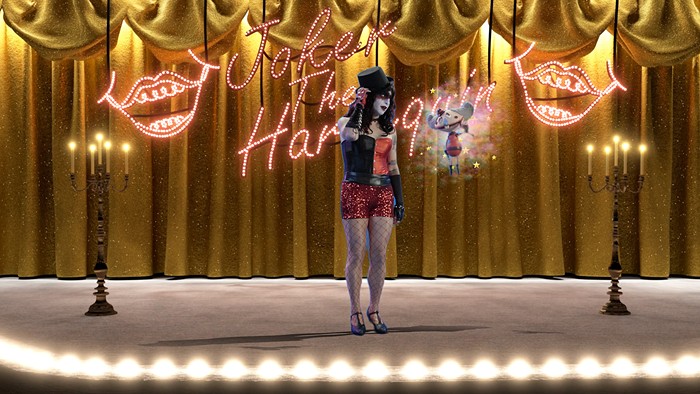CHRONIC DRINKING is the fanatically self-administered hoax of a life fully lived--lived to the hilt, hell-bent, bent to please and shapefully misshapen. Booze, consumed in extremis, with vim and vigor, offers the tight, internal logic of narrative, the compression of fable, the magnitude of myth, with a lot of fuzz and bleeding around the critical edges (to which the sot is unwillfully, and thankfully, ignorant). To drink like a fish is to fish out the trappings of drama from the perpetuation of ordinary personal failure--to pull the proverbial tempest from the proverbial tea cup (or rather shot glass) and let its meepy, soppy storm of incoherent longing suffuse your own atmospheric unhappiness. As the saying goes, God loves a drunk, because God just loves a good story, and if nothing else, consistent intoxication will jar and pickle you the most wonderful, miserable, fictional romance imaginable--the best story never told, but told anyway, just for the sheer hell of it.
And then, if you're ever so fortunate as to suddenly find your booze-busted ass sitting in a church basement, eating Oreos, drinking Nescafé and listening to all those queasy tales of devastation and regret, here's something you'll surely hear: No matter what you might think, you are no different. It's repeated like a mantra at meetings (over and over and over), and like so many of the tough love truisms that anchor the AA philosophy, this snippet of wisdom is both a hazing and a reminder--a difficult but crucial higher truth that new-comers absolutely must grasp and old-timers must never, ever forget. You are not different. Meaning: There are no extenuating circumstances that make yours an exceptional case. Meaning: You are just another fuck-up among like minded fuck-ups. Meaning: You are not, were not, nor ever will be in control of the story. Meaning: Your ego is misfiring. Meaning: Welcome to the first chapter.
(And the funny thing about recovery programs is this: You stay sober by telling stories about what the story your life became while drinking. That's exactly how and why it works--constant regurgitation of bad memories infinitely receding into the archetypal distance of bottled nostalgia. Mea culpa, pardon me, amen, and et cetera.)
Life is too boring. For a lot of folks, it's also too squishy, lonely, wishy-washy, and out of focus. On the unadorned surface of things, this hurtling world refuses to cough up even a modicum of meaningful structure; everything feels like a party that never quite gets started. And in return for this existential vacuum, daily life demands the impossible levy of resilience, fortitude, courage, and common sense. Of all the seven percent solutions to this extremely raw deal, of all the bone-headed antidotes to the incurable disease of ennui, alcohol is the undisputed king. Drinking doesn't solve a damn thing, but it sure feels like it does, and that's all that really matters: the immediate engagement of an eternal postponement. And so on. And so on.
Like so many people, my experimentation with alcohol began earnestly in college. It was the grandest awakening to realize that, along with the terror and beauty of being on my own in the not-quite adult world of academia came the fringe benefit--nay, the self-appointed fucking right--of drinking on weeknights. It was, I found, very nice to be drunk: to make warm, wry poetry of my personality, to say what I thought I thought, to occasionally trip down stairwells and make girls giggle. Swilling all that cheap beer seemed to work some kind of internal miracle of containment, a mental tightness that was actually sloppiness but which I nonetheless projected outward on the unruly situation of being alive. Which reminds me of the best drunken song lyric I've ever heard, actually written by an old drinking buddy of mine. It goes like this: "I've got a good thing goin' with the drinkin' problem, I buy the first round with a smile/ I talk to myself like I like me, and blame myself after a while."
These lines not only capture the feeling of being tanked, they are also very precisely to the point: the notorious camaraderie of drinking is primarily self-camaraderie, a means of simultaneously creating and entering your so-called life as the loving, lovable hero you know you must be. I liked the story of me drinking so much that I became a big old drunk. Sure, I loved having all those peripheral friends (how interesting and attractive and reliable they all were), but mostly I loved the liquid satisfaction of finally being comfortable in my own skin. I loved the adventurous predictability and manufactured spontaneity of routinely tying one on. I especially loved being myself and ignoring myself at the same time. It was a dream.
So, alas, my experiment with excess slowly (okay, maybe exponentially) turned into a full-time occupation. I didn't drink every day, but I drank more than every other day (okay, maybe I drank every day). I was a wreck, but it felt like well-structured wreckage. Looking back, I'm amazed that I ever got anything done at all. Perhaps I didn't. (I certainly never got past the "research phase" of that novel I always meant to write, the really earth-shattering one about the alcoholic anti-hero who rightfully gives up on trying). No--I didn't accomplish much of anything. Stuff happened to me (relationships, break-ups, phone bills) but I was pretty much a passive observer, far more interested in the tape-loops, hiccups, and cyclic soliloquies playing in my head than in the events, and even the people, that surrounded me.
I mean, really, why do anything but get drunk? It's the sadhappiest state--the perfect fit for this crazy world. And drinking cast such a rosy, romantic, deeply Zen glow on the inarticulate reasons for my lack of motivation. And drunken melancholy is so much more palatable than mere sadness. Ah, drunken clarity, that white-hot illumination bringing spiritual understanding.
But I kept forgetting the moral of the story. And days spilled into weeks, weeks into years. Ten years, to be exact. (It's been said that for every year of problem drinking, you need one year of recovery. It's also been said that the age at which you start drinking is the age at which you quit maturing emotionally. Okay: I started really guzzling at 19. I quit about two and a half years ago, plus a couple months of slippage. This means, if my calculations are correct, I have just recently turned 21. Happy Birthday! Anyone want to stand me a drink?)
Despite everything I've written, I really do think drinking helps. Unfortunately, as in my case, it sometimes helps you realize that you probably shouldn't drink. When Nicolas Cage's character in the film Leaving Las Vegas is told maybe he shouldn't drink so much, he retorts that maybe he shouldn't breathe so much. Perfect! As though the unlubricated life isn't worth living. (The illogical logic of Cage's self-destruction is so relentless that when he dies at the end of the movie, it seems like a victory). Booze, in the end, inverts the very juxtapositions that make it so damn attractive to begin with: sanity and insanity, meaning and meaninglessness, story and chaos, life and death. It's all ass-backwards, but it's the essence of the drama, this legendary battle with the bottle, this struggle to poison yourselfwell, just so, just so right, in a way that makes the wonky profile you see in the mirror of your imagination seem a perfect fit with reality.


















